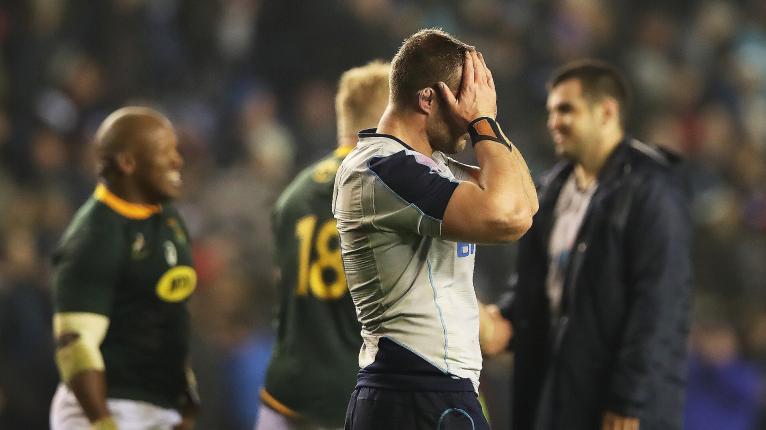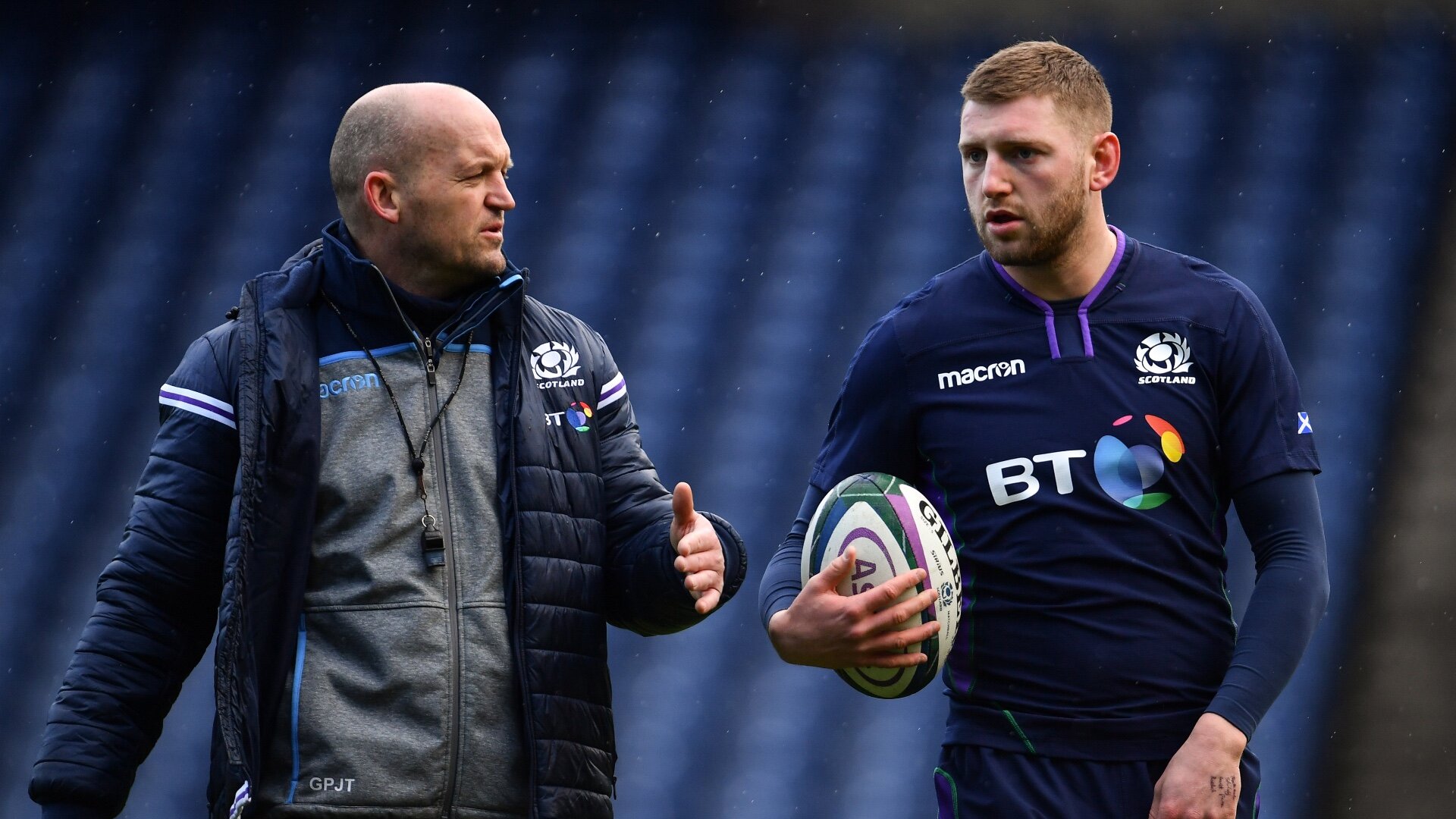Winners and losers from Gregor Townsend's Scotland squad announcement

The long-awaited and much-craved return of Finn Russell dominates the first Scotland squad announcement since the Covid-19 pandemic applied the buffers to an encouraging 2020. Russell’s poorly handed fall-out with Gregor Townsend threatened to derail the Six Nations campaign after a disastrous World Cup but the championship was an uplifting exercise in lessons learned.
With new specialist coaches, Scotland were meaner, played cannier and defended ferociously.
There were near misses against Ireland and England, but Italy and France were conquered and momentum was building for the final fixture in Cardiff before the tournament juddered to a halt.
Townsend has named two newly-eligible South Africans in an autumn group that features several typically bold selections.
Here, RugbyPass picks out the winners and losers from the 40-man squad.
Winners:
Finn Russell
Scotland will benefit immeasurably from a highly motivated and engaged Russell – which is exactly what they are getting – but the stand-off too has plenty to gain here. Russell loves playing for Scotland, and that he felt compelled to leave the team hotel on the eve of the Six Nations camp was a source of great anguish.
His form at Racing 92 has been consistently immense. He has delivered again and again in the Top 14 and in the ruthless warzone of the Champions Cup knockout phase. But you fancy Warren Gatland will want to see him bossing Test matches, particularly away from Murrayfield, if he is to start for the Lions next year.
There are few finer pivots in world rugby right now, and Russell’s return to the Scotland squad is cause for celebration.
He's back. ?https://t.co/G6gQzCjH32
— RugbyPass (@RugbyPass) October 12, 2020
Duhan van der Merwe
After Russell, the most exhilarating addition to the squad. Van der Merwe’s stats for Edinburgh are ridiculous – in last season’s Pro14, he scored seven tries, while making more metres, more clean breaks and beating more defenders than anyone else.
The winger is a titan of a man who shifts at unfathomable speed for his size. How he handles the step up to Test rugby will be fascinating. Edinburgh’s coaches have worked hard to improve his positioning and handling, and encouraged him to look for ball rather than waiting for it to come to his flank.

Van der Merwe’s weaknesses might be exposed more by international opposition than they are in the Pro14, but Scotland now have a whopping strike runner in their arsenal with enthralling potential.
Blair Cowan
Aged 34, with his most recent cap coming four years ago, Cowan must have thought his international days were done. He has been rewarded for relentlessly influential performances and impressive numbers on the open-side flank for London Irish, with his jackaling especially attractive under the new breakdown law interpretations.
Townsend was extremely taken with Cowan’s displays before lockdown and his continued proficiency since the Premiership’s restart.
Scott Steele
It will be fiendishly hard to unseat Ali Price and George Horne as the incumbent scrum-halves, but opportunities will arise in the autumn and it is up to Steele to seize them after a strong start to life at Harlequins. Townsend thinks very highly of him and seems impressed at how he had gone from contract-less at the start of the pandemic to performing well in the Premiership.
James Lang
Capped twice on a tour of the Americas over two years ago, Steel’s Quins team-mate has not been seen in a Scotland jersey since. Part of that owes to badly timed injury, but Townsend is a huge admirer of the play-maker. He might fill the second distributor role at 12 or be used off the bench as cover for both fly-half and midfield.
Oli Kebble
From the paucity of recent years, Scotland’s cup suddenly runneth over with high-calibre loose-head props. Kebble is a monstrous specimen and a hugely destructive scrummager, but also carries well and has a soft pair of hands.
Playing for Scotland was always his ultimate ambition since leaving the Stormers three years ago, and with his residency period complete, the hulking South African will challenge Rory Sutherland for a starting berth.
The loosehead, who will be available to Gregor Townsend for the first time under the residency rule, played a key role in the Warriors' 20-7 defeat of Scarlets.https://t.co/cjvYKRl7m7
— RugbyPass (@RugbyPass) October 11, 2020
Losers:
Sam Hidalgo-Clyne
A little over a year ago, Hidalgo-Clyne couldn’t make a Scarlets match-day 23. In a couple of weeks, he might very well be an English and European champion.
Rob Baxter spied in the scrum-half a brilliant operator who had, for various reasons, tumbled down the pecking order for region and country. The crispness of his passing, accurate kicking game and abrasiveness on the carry make for a rounded game, and he is blossoming anew at Exeter Chiefs.
The fact that his back-to-back final outings will prevent him training with Scotland for the first fortnight of the camp counted against him, but he could yet force his way in.
Mark Bennett & Matt Scott
An attacking fulcrum for Edinburgh, Bennett is highly experienced and excelled under Townsend at Glasgow. Finally injury-free for an extended spell, he is performing well for Edinburgh. Scott was among the club’s most effective and prominent players last term and his form has not dropped significantly in a toiling Leicester Tigers squad in transition. The sheer volume of high-quality centres with credit in the bank did for both of them.
Allan Dell
The loose-head was Scotland’s first-choice a year ago, but the emergence of Sutherland and qualification of Kebble have shunted him out of the squad. He might be aggrieved to be usurped by Jamie Bhatti, who has only played 17 minutes of rugby post-lockdown, but hasn’t done enough for London Irish to compel Townsend.

Edinburgh and Glasgow Warriors
Arguably, those who suffer the greatest losses from this squad announcement are the two pro-teams who supply the vast bulk of the players.
Edinburgh and Glasgow contribute a combined 29 of the 40 men in the squad. This in itself is not unusual, and nor is it generally a massive cause for alarm. Some will be released for Pro14 duty when not involved in Test matches.
But with Scottish Rugby implementing a recruitment freeze amid the pandemic, neither side has been able to recruit as they would have liked. There are sizeable gaps in both squads. Cockerill and Danny Wilson will be left relying on kids and fringe players to plug holes and grasp opportunities.





































































